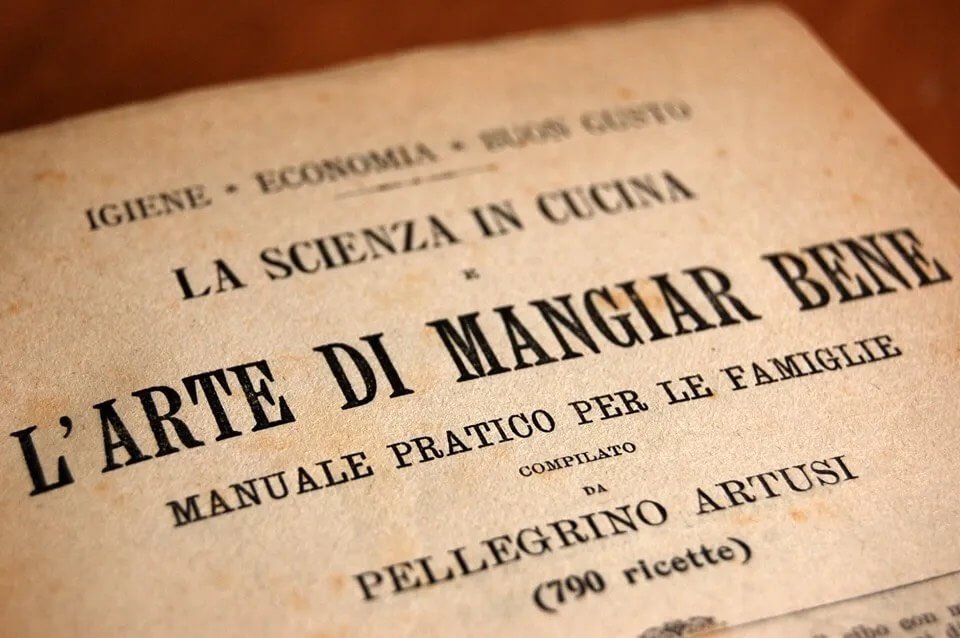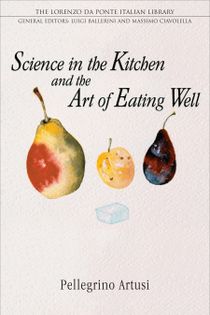
Advertisement

Science in the Kitchen and the Art of Eating Well
from the publisher
First published in 1891, Pellegrino Artusi’s La scienza in cucina e l’arte di mangiar bene has come to be recognized as the most significant Italian cookbook of modern times. It was reprinted thirteen times and had sold more than 52,000 copies in the years before Artusi’s death in 1910, with the number of recipes growing from 475 to 790. And while this figure has not changed, the book has consistently remained in print.
The recipes in Scienza in cucina have withstood the test of time.... La scienza in cucina e l’arte di mangiar bene is 110 years old, yet around the world Pellegrino Artusi’s cookbook is as popular as ever. In Italy, the book is revered, and few home are without at least one stained and tattered copy, passed down like a family heirloom from mother to daughter. With hundreds of new cookbooks published every year, it is remarkable that one more than a century old has survived.
Yet, there are many reasons for its longevity. At the time it was published in 1891, Scienza in cucina was the first cookbook written in Italian for the home cook. Other cookbooks of the era typically were written by French-trained chefs who either wrote in French or focused on French cooking. Their works were geared towards other professionals employed in wealthy homes.
This is the culinary equivalent of browsing the internet or leafing through an encyclopedia. The recipes in Scienza in cucina have withstood the test of time and rarely seem dated or outmoded. Ricotta cake, saltimbocca, and frittatas are as familiar and as easily prepared and enjoyed today as they were 100 years ago. Few restaurants that claim to be Italian would be without Bolognese-style ragu, ravioli filled with meat or cheese, pasta with beans, risotto, and roasted and stewed meats on the menu, all of which can be found in Scienza in cucina. Though Artusi would never have imagined it, his recipes continue to be used by cooks the world over who appreciate Italian home cooking.
Artusi reassures the reader and boosts his or her confidence. In his introduction, Artusi states that he is an amateur who has collected these recipes over the course of the years, and that his readers, with a little practice, can achieve impressive results if they heed his advice. Throughout the book, Artusi reassures the reader and boosts his or her confidence. With regard to apple strudel, Artusi declares: “Do not be alarmed if this dessert looks like some ugly creature such as a giant leech or a shapeless snake after you cook it; you will like the way it tastes”
"Artusi's book stands with Manzon's great novel, I Promessi Sposi (The Betrothed), and the music of Verdi as works that not only are great unto themselves but represented a sense of identity and self-worth to a nascent country with no nationalistic feeling ... Artusi chose to give Italians their definition by telling them how they ate ... Anyone who seeks to know Italian food avoids Artusi at his or her peril. He is the fountainhead of modern Italian cookery." - Fred Plotkin - Gastronomica
"One of the defining documents of what it means to be Italian." - John Allemang - The Globe and Mail
Most popular
- Original Publisher
- Marsilio Publishers
- Date of publication
- 1998
- ISBN
- 0802086578
Features & Stories

Recommended by
Sue Dyson and Roger McShane
Food writers
This is a classic Italian cookbook that is written with passion, humility, irreverence and humour. The recipes are well worth trying even though the book was written in the late nineteenth century. We strongly believe that we can all learn a lot from history. This is just as important in cooking as it is in all other areas of human endeavour. Therefore we like to turn to the classic cookbooks to seek out the background to the recipes of today. The more we delve into it, the more this classic Italian offering inveigles itself into our consciousness.
Elizabeth Romer
Food writer and historian
The essential cookery book of the 'Republic of Italy', although it does not contain recipes from every area of the peninsula Artusi's contribution to the language, culinary and otherwise, of the new Italy, is vital. His recipes are still today trusted and enjoyed in innumerable Italian kitchens.
Ivan Brincat
Food and Wine Gazette
Translated into English in 1996 (I've have an old Italian version), this is your go to guide for understanding the history of Italian cuisine. It has been in print (in Italian) since 1894. An essential book for lovers of Italian cuisine.
Eleanor Barnett
Food historian
First published in 1891, a classic work to explore the history of Italian food. Written after the unification of Italy, Artusi brought together hundreds of recipes from across the peninsula.
Bill Buford
Author
The bible of modern (i.e. from the 18th century on) Italian cooking, ably translated, and the authority on just about every dish you'll find on an Italian table.
Valeria Necchio
Cookbook author
First published in 1891, it's the bible of traditional Italian cooking.
Henry Notaker
Literary historian
A culinary contribution to Italian unity.
Bruce Palling
Journalist
Matthew Fort
Food writer and critic
Lorenzo Cogo
Chef and owner of EL COQ restaurant – one Michelin Star in Italy
Giorgio Locatelli
Chef and restaurateur
Franco Taruschio
Chef/proprietor and cookbook author
Carol Field
Food writer and broadcaster
Jacob Kenedy
Chef
Colman Andrews
Food writer and editor
Ben Reade
Co-Owner/Chef at Edinburgh Food Studio
Anna Del Conte
Food writer
Giulia Scarpaleggia
Food writer
Russell Norman
Restaurateur, writer, broadcaster
Caz Hildebrand
Creative Partner at Here Design
Advertisement





















